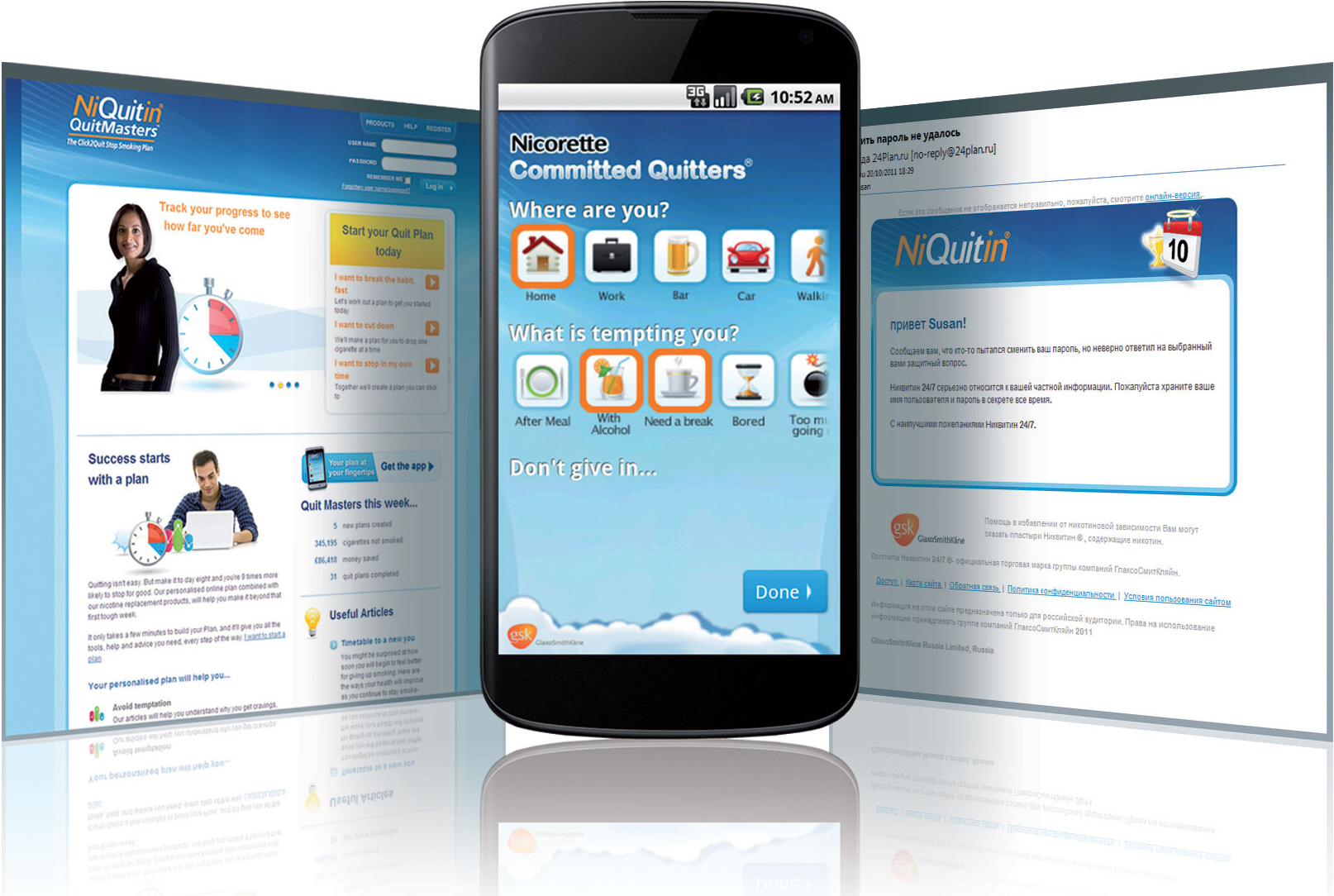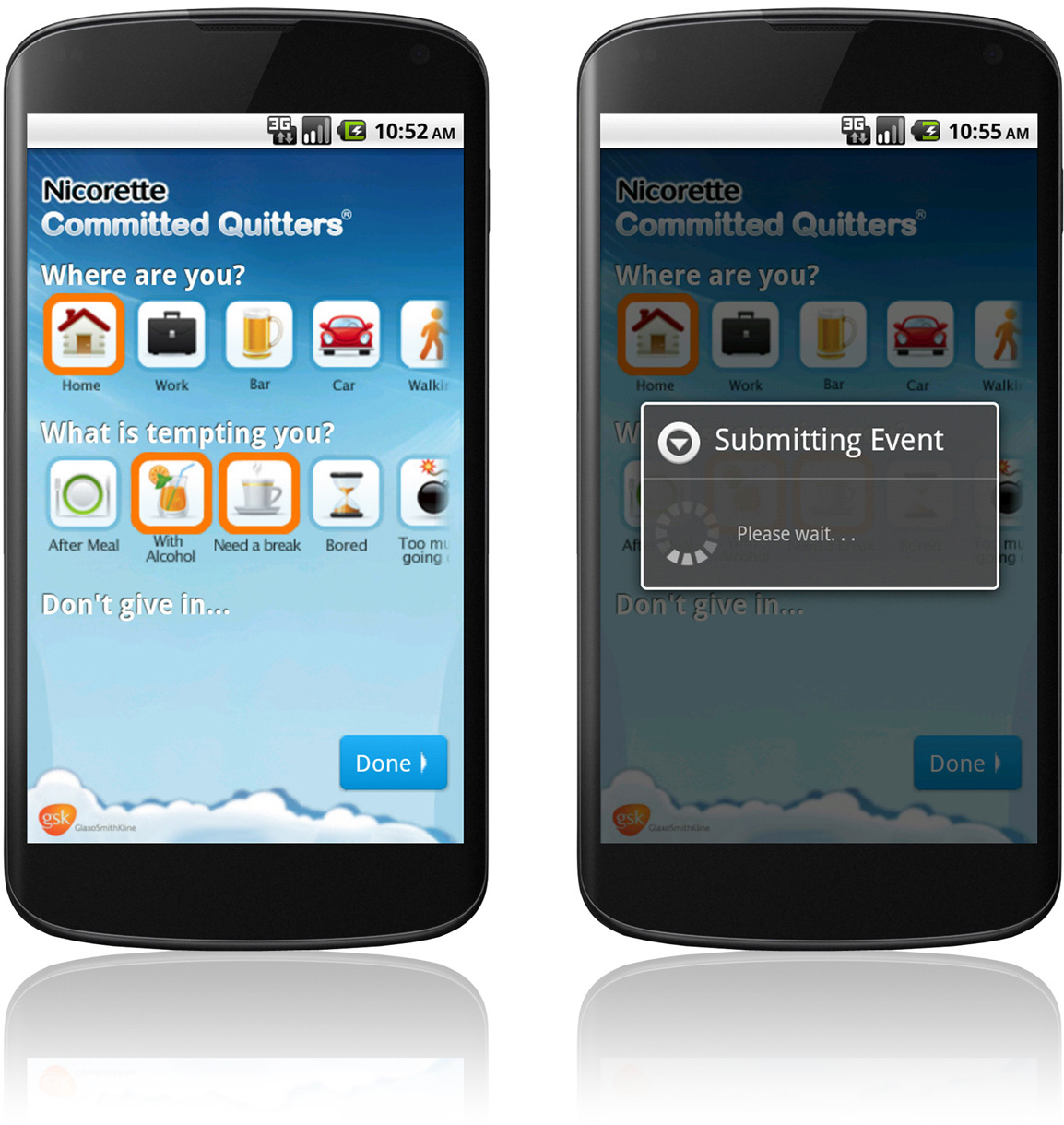Extending a Web Platform for a Global Audience
In a world of increasing online engagement, a first-rate online experience is paramount for the success of many products. This is increasingly true for consumer healthcare products, such as the Nicotine Replacement Therapy (NRT) products marketed by the global pharmaceutical giant GlaxoSmithKline (GSK).
GSK approached Priocept in 2010 to help extend, improve and support its global NRT web application platform. The primary function of these NRT web applications is to act as a Behavioural Support Programme (BSP) to users of GSK smoking cessation products, helping them to track their smoking habits and plan a reduction in smoking or quitting altogether.
The features of the BSP include the ability for users to track their smoking temptations and the number of cigarettes smoked, in addition to tracking the reasons for giving in to a cigarette and their motivations for quitting. Many studies have proven that NRT in conjunction with a behavioural support program (BSP) increases a smoker’s chances of quitting. The original system had been designed for English-language markets only, and so the key challenge was to evolve the system to cater for a global rollout supporting over fifteen countries and languages.

This case study explores how Priocept developed the application over 9 months from a mono-lingual, single-market tool into a global, multi-lingual, multi-channel and multi-market platform using Alterian Dynamic Messenger and the Google Android mobile platform.
Requirements
GSK had ambitious plans to roll out the NRT application platform across a range of different countries and markets, covering over fifteen different languages, supporting marketing and product launch activities in each of these areas. The updated web platform needed to be highly engaging for users, both through the application experience and by the modes of engagement. This meant that the existing application architecture – designed for a single market, a single language (English) and a single channel (desktop web browser) – needed to be updated to cater for multi-lingual, multi-market and multi-channel use, recognising users in their language whichever device (browser, mobile, tablet, etc.) they chose to use to access the online tools. In addition, GSK had a clear requirement for non-technical digital product owners and content authors to be able to make modifications to both the content on the website, and to the rules governing when content should be displayed, making the solution more complicated than many typical content-managed websites.
The Solution – Priocept, EPiServer CMS and Alterian Dynamic Messenger
A key part of the solution to these exacting requirements was to use the same system or “engine” for content management as for the management of the content “rules” governing when particular content should be displayed. In this case, EPiServer was the incumbent content management system (CMS) in place, and Priocept decided to retain this CMS due to the large amount of logic and functionality already present in the legacy English-language web application. This allows content editors and digital product owners in different markets and countries to configure the content display rules according to the requirements of their own market.
Content Delivery Rules
The web platform uses a “rules engine” to determine when to show particular text and images (“content”). These activation and weighting rules are configured within EPiServer CMS rather than being “baked into” the application or hidden in obscure configuration files.
Exposing the content delivery rules directly to content editors and digital product owners gives these users real flexibility and power to configure the application for their market in the most appropriate way possible, without affecting the rules for other markets or countries. Ultimately, this results in an optimum user experience for all customers, as they see only the content appropriate for their market and country.
Increasing Customer Engagement
A key driver for the global rollout of the online NRT BSP platform was to increase engagement with customers. Priocept used three main ways to increase customer engagement:
- Improved User Experience (UX)
- Mobile Apps
- Reminder Emails
The combination of these three features proved to be a powerful way to improve customers’ experience of the platform.
Optimising the User Experience
In order to optimise the user experience (UX) when using the online tools, Priocept used A/B testing techniques to analyse user behaviour across key parts of the online application. Behaviour tracking was done using Adobe SiteCatalyst Powered by Omniture.
This enabled Priocept to identify the most effective UX for particular user types and update the user interface accordingly. The result was a significant increase in the number of people completing the registration process and signing up for email alerts.
Multiple Interactive Multilingual Mobile Apps
A major addition to the GSK offering was a series of mobile applications which allow users to record smoking temptation events whether in a bar or watching TV at home.
Priocept developed mobile applications for Android mobile devices which worked both online (3G or WiFi) or offline (disconnected). The applications allow users to track smoking temptation events even when out of signal range (such as when underground), and then synchronise the data later. When the user next logs on, they see the data synchronised previously from the mobile app.

To support the mobile apps, Priocept designed and built a web services API using Windows Communication Foundation (WCF) services. The API is platform independent and includes advanced features designed to support both legacy and new versions of the mobile applications, but also to allow newer communication protocols to be rolled out without breaking older versions.
The Power of Email
An important feature of the platform was the use of email alerts for registered users of the application. Users could subscribe to a variety of email alerts for various situations or to remind them to take an action, such as logging in and recording their statistics. For this, Priocept used the Alterian Dynamic Messenger (DM) email delivery platform with its powerful email delivery and reporting/analysis capabilities to send emails to a subscriber base of more than 50,000 users.
Priocept created branded multi-lingual email templates and email trigger rules within the EPiServer rules and content engine, and connected these to Alterian Dynamic Messenger for scheduled delivery at appropriate times across the various markets, countries and time zones.
Planning and Delivering Multi-Lingual and Multi-Market Applications
Adapting an existing legacy web application built for a single language and market to work with multiple languages, multiple markets and multiple time zones can be a daunting task. However, Priocept used prior experience of building multi-lingual content-driven web applications (including right-to-left languages such as Arabic) to help plan and deliver a sequence of roll-outs based a detailed roadmap agreed with GSK.
As of late 2011 the platform has been rolled out to Russia (in Russian and English), USA, UK, Australia, and Malaysia, with plans for further rollouts in EMEA and the Americas during 2012 and beyond. This means that not only Latin left-to-right languages are employed but also Cyrillic, Chinese and right-to-left languages such as Arabic. Operating a global customer-facing web platform requires changes in maintenance and operational activities: there is no longer a natural time for maintenance activities on the website, so additional technical features must be introduced to maintain service levels for all customers, whichever time zone they may be in.
Key Technologies
The key technologies used by Priocept to expand and develop the GlaxoSmithKline NRT platform included:
- EPiServer CMS v5 and v6 (www.episerver.com)
- Microsoft Windows Server 2008, Microsoft SQL Server 2008 and Microsoft ASP.NET 3.5 on IIS7
- WCF for the web service API for mobile devices
- Interactive mobile applications for Android mobile devices linking to the web platform via the web services API
- Alterian Dynamic Messenger email delivery platform
Priocept was responsible for designing all key parts of the new system, including changes to the hosting/datacentre infrastructure.
Results
Taking what was a mono-lingual, English-only web application designed for a single market, Priocept has transformed the product into a multi-lingual global web platform for multiple markets and brands, supporting Latin, Cyrillic, Arabic and Chinese character sets, per-market customisations, and support for interactive mobile applications via a fully-featured and optimised mobile API.
This has enabled GlaxoSmithKline to expand its Behavioural Support Programme for its Nicotine Replacement Therapy products into several new markets and increase its brand presence globally in the rapidly-growing area of online consumer healthcare.
Content authors and digital product owners in many different markets and countries can configure the content rules and email rules to suit their local requirements. This, combined with in-depth A/B and multi-variant testing, provided enhanced engagement for GSK’s customers and a notable increase in the number of customers successfully quitting or reducing their smoking habit.
